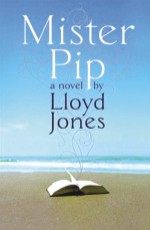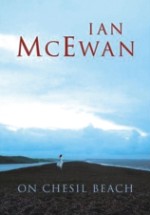|
Book Review
This week we round up our reviews of the short listed books for The Man Booker Prize 2007. With the announcement of the winning book on the 16th of October we have left the bookmakers favourites for our last two reviews. Lloyd Jones and Ian McEwan seem the odds on favourites to win the prize and in a race that is too close to call. We have paired their reviews together, thus bringing an end to our Booker 2007 short list reviews, which started from September 14 with Nicola Barker's, Darkmans.
Mister Pip
DJ Taylor
 Perhaps the most famous example of what might be called the Dickensian afterlife comes at the end of Evelyn Waugh's A Handful of Dust (1934). Here a British explorer, rescued from the Amazonian jungle, is held prisoner by the illiterate Mr Todd, who supplies food in return for a daily dose of one of Dickens's novels. To Waugh, Bleak House and Dombey and Son are a technical device to drive on the plot. In Mister Pip, Lloyd Jones uses Great Expectations to underpin the destiny of an entire community. Perhaps the most famous example of what might be called the Dickensian afterlife comes at the end of Evelyn Waugh's A Handful of Dust (1934). Here a British explorer, rescued from the Amazonian jungle, is held prisoner by the illiterate Mr Todd, who supplies food in return for a daily dose of one of Dickens's novels. To Waugh, Bleak House and Dombey and Son are a technical device to drive on the plot. In Mister Pip, Lloyd Jones uses Great Expectations to underpin the destiny of an entire community.
Bougainville, where this devious meta-fiction takes place, is a South Pacific island plunged into decline in the dismal early 1990s. The white men have left with the closure of the local mine. Gunfire from an ongoing civil war between the "redskins" of the government forces and jungle-crawling insurrectionists ("rambos") features on the daily soundtrack. A single white man survives enigmatic, linen-suited Mr Watts, known to the villagers as "Pop Eye", who can sometimes be seen pushing his trolley-bound wife along the beach.
All this is quietly observed by a teenager called Matilda Laimo, whose father jumped ship for "Townville" (Australia) four years back, along with his temperamental failings. Each of the underlying tensions that were built up in the opening chapters personal, communal and political is brought into focus by Mr Watts's decision to reopen the school as a venue for daily readings of a book that begins: "My father's family name being Pirrip, and my Christian name Philip, my infant tongue could make of both names nothing longer or more explicit than Pip."
Very soon, the storytelling sessions are both bulked out by older relatives, bidden by Mr Watts to impart cooking tips or local lore, and undermined by conflict. One strand of dissent involves pious Mr Laimo, who regards Mr Watts as godless. Much more serious is the arrival of a detachment of redskins wanting information about "Mr Pip". The book, which Mrs Laimo has quietly concealed in her absent husband's sleeping mat, gets incinerated in a punitive trashing of the village.
Imperceptibly, what began life as a hymn to the redemptive power of literature turns into a sinister and bloody account of life on the Third World garbage truck. By the time that Mr Watts sits down to re-create the novel to an audience of villagers and fascinated "rambos", its horizons seem to have expanded to include the nature of storytelling, the landscapes of memory and a great deal else besides.
The coda of the tale, in which a globe-trotting adult Matilda clocks Mr Watts for a shabby fantasist and finds that Satis House has been converted into an apartment block, is in some ways even more of a corrective than the brutality that precedes it. If Mister Pip has one faint blemish, it is that some of its imaginative connections are overstated. We know what Matilda has gained from an exposure to Dickens: further comment can be superfluous. Rarely, though, can any novel have combined charm, horror and uplift in quite such superabundance.
This review first appeared in The Independent (UK)
On Chesil Beach
Lionel Shriver
 To commend an author for being reminiscent of Edith Wharton is a compliment that this reviewer reserves for a select few. Yet with On Chesil Beach, Ian McEwan has To commend an author for being reminiscent of Edith Wharton is a compliment that this reviewer reserves for a select few. Yet with On Chesil Beach, Ian McEwan has
earned it.
His 13th novel is admittedly not a bargain. Physically small, with lines widely spaced, it is really a novella. But hey, what's wrong with that? The novella is an under-explored form these days, and one whose length ideally suits McEwan's sparse, clean storyline.
The exact period in which the story is set is also under-explored - 1962, a year chosen to precisely mark a "before" picture of Britain. Not just before the Beatles took over the world but, most importantly for our hapless protagonists, before the sexual revolution, which put Our Bodies, Ourselves and The Joy of Sex in every bookshop.
Hence the Whartonian overtones of McEwan's tale. In terms of sexual mores, between Wharton's early 1900s and McEwan's early 1960s, not much had changed:
"This was still the era - it would end later in that famous decade - when to be young was a social encumbrance, a mark of irrelevance, a faintly embarrassing condition for which marriage was the beginning of a cure."
Naive and inexperienced, Florence and Edward have sought such a cure. The tale begins on their wedding night, in a hotel on the Dorset coast where they will spend their honeymoon.
Since Edward's "single most important contribution to the wedding arrangements was to refrain, for over a week," from any young man's favourite pastime, he is brimming with eagerness.
The same could not be said of his new wife, who first encountered the alarming implement of her pending deflowering by brushing against Edward's lap in the cinema. Ever since, she has conducted a "secret affair between disgust and joy".
A forceful violinist with strong facial features, Florence is horrified by the nuptials that await on the other side of a dour room-service dinner for which the couple has no appetite. (One of the many exquisite period touches is the fare on offer - in particular the melon starter, stained with
a single candied cherry.)
She loves Edward and yearns to please him, but approaches their congress with gritted teeth, convinced that something is wrong with her. When he kisses her in that way she so dislikes, she curls her tongue to the back of her mouth, in recoil from the prodding of his own.
Edward has always interpreted his fiancée's physical reticence as decorum. Yet once the evening arrives when the rest of the world smiles on the most radical of intimacies, her rigid disengagement is gradually revealed as not social but constitutional.
Dinner is put aside, and the two retire resolutely to bed, still far from the consummation of the marriage. Edward reflects on why they are not already at it like bunnies:
"And what stood in their way? Their personalities and pasts, their ignorance and fear, timidity, squeamishness, lack of entitlement or experience or easy manners, then the tail end of a religious prohibition, their Englishness and class, and history itself. Nothing much at all."
Nevertheless, the curious stirring that Florence feels from the accidental flicking of a single pubic hair provides a clue that her natural inclinations are what we would now like to think of as normal.
Because this is a slight book, it would be unfair to detail the unfolding of this evening any further. Suffice it to say that the tiny tragedy of one wedding night - which has large-scale implications - is heartbreaking, understandable from both parties' perspectives, and sickeningly unnecessary.
McEwan sketches in the political context of 1962 as precisely as the social context. Older generations are still clinging to Britain's role in the Second World War and are reluctant to relinquish its reputation as a world power.
Younger folks such as Florence and Edward are happy enough to see the back of the Empire, and to embrace a lighter, less encumbered country. They accept Britain as "a minor power - saying this gave a certain blasphemous pleasure".
By contrast, "anyone over 40 would have fought, or suffered, in the war and known death on an unusual scale, and would not have been able to believe that a drift into irrelevance was the reward for all that sacrifice".
Most of all, McEwan makes the case that, for all the tattiness of an overly eroticised modern culture, the sexual revolution brought some benefits. Ignorance can give rise to brutality. Set a handful of years later, On Chesil Beach would have told a less wrenchingly elegiac but far happier story.
This review first appeared in The Telegraph.
Copyright
(R) thedailystar.net 2007 |
